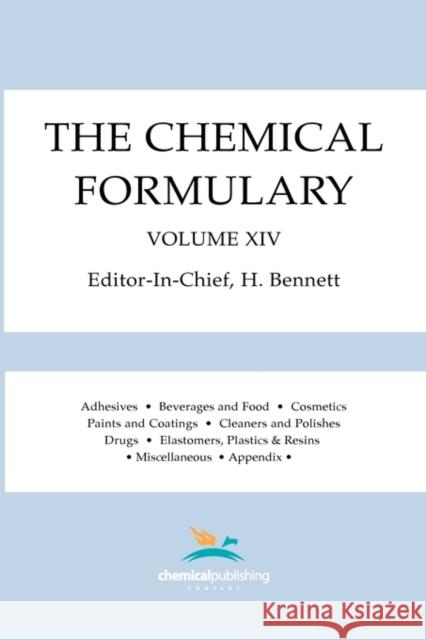The Chemical Formulary, Volume 14 » książka
The Chemical Formulary, Volume 14
ISBN-13: 9780820600680 / Angielski / Miękka / 1968 / 378 str.
There is hardly any technical library in the world in which the volumes of the Chemical Formulary (Volumes 1-34) do not occupy a prominent place. It does not duplicate any of the formulas included in previous volumes, but lists a wide array of modern and salable products from all branches of the chemical industries. An excellent reference for formulation problems. - CONTENTS - 1. Introduction - 2. Adhesives - 3. Cement and Ceramics - 4. Coatings - 5. Cosmetics and Drugs - 6. Detergents - 7. Emulsions and Dispersions - 8. Farm and Garden Formulations - 9. Foods, Beverages and Flavors - 10. Inks - 11. Metals and Treatments - 12. Paper - 13. Polish - 14. Rubber, Plastics and Waxes - 15. Miscellaneous - Appendix - Some Incompatible Chemicals - Tables - Note on Trademark Chemicals - Chemicals (Trademarks) - List of Suppliers - Index - PREFACE - Chemistry, as taught in our schools and colleges, concerns chiefly synthesis, analysis, and engineering-and properly so. It is part of the right foundation for the education of the chemist. Many a chemist entering an Industry soon finds that most of the products manufactured by his concern are not synthetic or definite complex compounds, but are mixtures, blends, or highly complex compounds of which he knows little or nothing. The literature in this field, if any, may be meager, scattered, or obsolete. Even chemists with years of experience In one or more Industries spend conslderable time and effort in acquainting themselves with any new field which they may enter. Consulting chemists similarly have to solve problems brought to them from industries foreign to them. There was a definite need for an up-to-date compilation of formulae for chemical compounding and treatment. Since the fields to be covered are many and varied, an editorial board of chemists and engineers engaged in many industries was formed. Many publications, laboratories, manufacturing firms, and Individuals have been consulted to obtain the latest and best information. It is felt that the formulas given in this volume will save chemists and allied workers much time and effort.
There is hardly any technical library in the world in which the volumes of the Chemical Formulary (Volumes 1-34) do not occupy a prominent place. It does not duplicate any of the formulas included in previous volumes, but lists a wide array of modern and salable products from all branches of the chemical industries. An excellent reference for formulation problems. - CONTENTS - 1. Introduction -2. Adhesives -3. Cement and Ceramics -4. Coatings -5. Cosmetics and Drugs -6. Detergents -7. Emulsions and Dispersions -8. Farm and Garden Formulations -9. Foods, Beverages and Flavors -10. Inks -11. Metals and Treatments -12. Paper -13. Polish -14. Rubber, Plastics and Waxes -15. Miscellaneous -Appendix - Some Incompatible Chemicals -Tables - Note on Trademark Chemicals -Chemicals (Trademarks) -List of Suppliers -Index - PREFACE - Chemistry, as taught in our schools and colleges, concerns chiefly synthesis, analysis, and engineering-and properly so. It is part of the right foundation for the education of the chemist. Many a chemist entering an Industry soon finds that most of the products manufactured by his concern are not synthetic or definite complex compounds, but are mixtures, blends, or highly complex compounds of which he knows little or nothing. The literature in this field, if any, may be meager, scattered, or obsolete. Even chemists with years of experience In one or more Industries spend conslderable time and effort in acquainting themselves with any new field which they may enter. Consulting chemists similarly have to solve problems brought to them from industries foreign to them. There was a definite need for an up-to-date compilation of formulae for chemical compounding and treatment. Since the fields to be covered are many and varied, an editorial board of chemists and engineers engaged in many industries was formed. Many publications, laboratories, manufacturing firms, and Individuals have been consulted to obtain the latest and best information. It is felt that the formulas given in this volume will save chemists and allied workers much time and effort.











